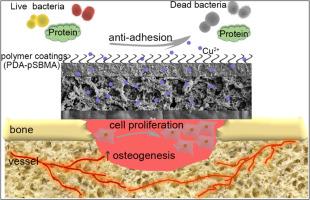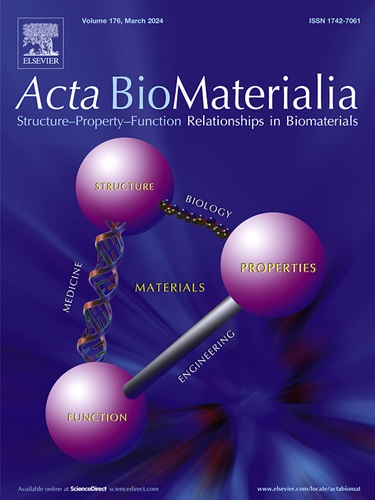Biocompatible chitin-based Janus hydrogel membranes for periodontal repair
IF 9.4
1区 医学
Q1 ENGINEERING, BIOMEDICAL
引用次数: 0
Abstract
Periodontal defects caused by severe periodontitis are a widespread issue globally. Guided tissue regeneration (GTR) using barrier membranes for alveolar bone repair is a common clinical treatment. However, most commercially available collagen barrier membranes are expensive and lack the antibacterial properties essential for effective bone regeneration. Herein, we report a natural polysaccharide chitin hydrogel barrier membrane with a Janus structure (ChT-PDA-p-HAP), featuring high antibacterial and protein-repelling activity on the outer side and good osteogenesis ability on the inner side. This multifunctional membrane is fabricated though a three-step process: (i) dissolution and regeneration of chitin, (ii) co-deposition with polydopamine (PDA) and poly(sulfobetaine methacrylate) (pSBMA), and (iii) coating with gelatin-hydroxyapatite (gelatin-HAP). In vitro cell experiments demonstrated the membrane's high biocompatibility and significant osteogenic activity. In vivo implantation in rats with periodontal defects revealed that the cemento-enamel junction index of the ChT-PDA-p-HAP membrane (1.165 mm) was superior to that of the commercial Bio-Gide® membrane (1.350 mm). This work presents a method for fabricating a chitin-based Janus barrier membrane, potentially expanding the use of chitin in tissue engineering.
Statement of significance
This study introduces a Janus hydrogel membrane based on chitin, tailored for guided tissue regeneration in periodontal defects. By combining antibacterial properties and osteogenic capabilities in a single membrane, the ChT-PDA-p-HAP membrane represents a significant advancement over traditional collagen barriers. Its outer surface, enhanced by Cu2+ and PDA-pSBMA coatings, resists bacterial colonization and protein adhesion effectively, while the inner side, coated with gelatin-HAP, promotes robust bone formation. In vitro experiments demonstrate high biocompatibility and substantial osteogenic differentiation, while in vivo testing in rat models confirms good therapeutic efficacy compared to commercial membranes. This multifunctional approach not only utilizes chitin's abundant natural resource but also integrates simple coating techniques to enhance therapeutic outcomes in periodontal tissue engineering, offering promising avenues for broader biomedical applications.

用于牙周修复的生物相容性甲壳素基 Janus 水凝胶膜。
严重牙周炎导致的牙周缺损是全球普遍存在的问题。使用屏障膜进行牙槽骨修复的引导组织再生(GTR)是一种常见的临床治疗方法。然而,大多数市售胶原蛋白屏障膜价格昂贵,且缺乏有效骨再生所必需的抗菌特性。在此,我们报告了一种具有 Janus 结构的天然多糖甲壳素水凝胶屏障膜(ChT-PDA-p-HAP),其外侧具有很高的抗菌和蛋白质排斥活性,而内侧则具有良好的骨生成能力。这种多功能膜的制作分为三个步骤:(1) 甲壳素的溶解和再生;(2) 聚多巴胺(PDA)和聚甲基丙烯酸磺基甜菜碱(pSBMA)的共沉积;(3) 明胶-羟基磷灰石(明胶-HAP)的涂层。体外细胞实验表明,这种膜具有很高的生物相容性和显著的成骨活性。在牙周缺损的大鼠体内植入 ChT-PDA-p-HAP 膜后发现,ChT-PDA-p-HAP 膜的骨水泥-釉质连接指数(1.165 毫米)优于商用 Bio-Gide® 膜(1.350 毫米)。这项研究提出了一种制造基于甲壳素的 Janus 阻隔膜的方法,有望扩大甲壳素在组织工程中的应用。意义说明:本研究介绍了一种基于甲壳素的 Janus 水凝胶膜,专门用于引导牙周缺损的组织再生。与传统的胶原屏障相比,ChT-PDA-p-HAP 膜将抗菌特性和成骨能力集于一身,是一项重大进步。它的外表面由 Cu2+ 和 PDA-pSBMA 涂层增强,能有效抵抗细菌定植和蛋白质粘附,而内侧则涂有明胶-HAP,能促进骨质形成。体外实验证明,这种膜具有很高的生物相容性和大量的成骨分化,而大鼠模型的体内试验则证实,与商用膜相比,这种膜具有良好的治疗效果。这种多功能方法不仅利用了甲壳素丰富的天然资源,还整合了简单的涂层技术,提高了牙周组织工程的治疗效果,为更广泛的生物医学应用提供了前景广阔的途径。
本文章由计算机程序翻译,如有差异,请以英文原文为准。
求助全文
约1分钟内获得全文
求助全文
来源期刊

Acta Biomaterialia
工程技术-材料科学:生物材料
CiteScore
16.80
自引率
3.10%
发文量
776
审稿时长
30 days
期刊介绍:
Acta Biomaterialia is a monthly peer-reviewed scientific journal published by Elsevier. The journal was established in January 2005. The editor-in-chief is W.R. Wagner (University of Pittsburgh). The journal covers research in biomaterials science, including the interrelationship of biomaterial structure and function from macroscale to nanoscale. Topical coverage includes biomedical and biocompatible materials.
文献相关原料
公司名称
产品信息
阿拉丁
Gelatin type A
阿拉丁
Agarose
阿拉丁
Dopamine hydrochloride
阿拉丁
3-[Dimethyl-[2-(2-methylprop-2-enoyloxy) ethyl] azaniumyl] propane-1-sulfonate (SBMA)
阿拉丁
Hydroxyapatite (HAP)
 求助内容:
求助内容: 应助结果提醒方式:
应助结果提醒方式:


